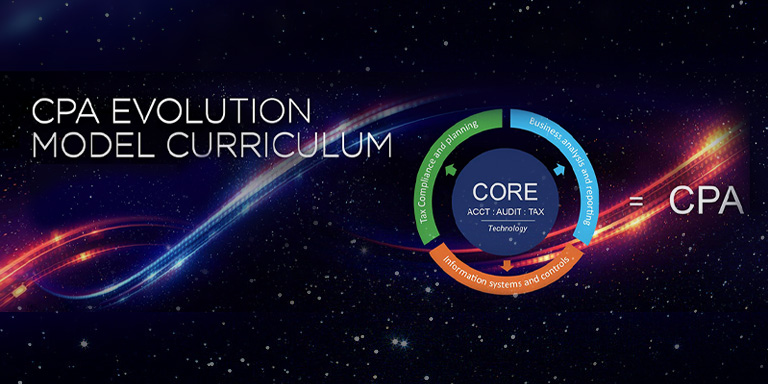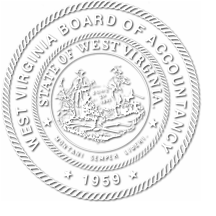AICPA and NASBA Release CPA Evolution Model Curriculum
5/16/2022|
 Curriculum Developed for Accounting Programs in Advance of CPA Licensure Model Changes Coming in 2024 NEW YORK, NASHVILLE (June 15, 2021) – The American Institute of CPAs (AICPA) and National Association of State Boards of Accountancy (NASBA) today released the CPA Evolution Model Curriculum. The new Curriculum is the next step in the CPA Evolution initiative, a joint AICPA/NASBA initiative that is transforming the CPA licensure model to recognize the rapidly changing skills and competencies the accounting profession requires. The Curriculum was developed by the CPA Evolution Model Curriculum Task Forces, a group of more than 40 volunteers from across the profession, including faculty from small colleges to large universities, CPAs in public practice as well as business and industry, and representatives from State Boards of Accountancy. The Curriculum reflects the skills newly licensed CPAs need in the current practice environment and serves as a model of how an accounting program could transition to prepare CPA candidates for the Core + Disciplines CPA Exam structure that will test those skills starting in 2024. “A skill set that includes a deep understanding of new and emerging technologies is essential for CPAs entering the profession. We heard from accounting faculty that they want insight into how to begin transitioning their programs to teach these skills and better prepare students for the coming Core + Disciplines CPA Exam structure,” said Sue Coffey, CPA, CGMA, CEO of Public Accounting – American Institute of CPAs. “We’re excited to share the work of our Task Forces and help faculty prepare a strong pipeline of future CPAs who will continue to meet the changing needs of U.S. capital markets.” The Curriculum release follows a recent AICPA and NASBA study highlighting gaps between existing accounting curriculum and topics tested under the new CPA Exam. That report found mixed results for educational coverage of new and emerging technology topics across accounting programs nationwide. The launch of the Curriculum is timely as rising college sophomores enrolled in accounting programs today will be among the first to take the updated version of the CPA Exam when it launches in 2024. “The CPA Evolution Model Curriculum is a valuable resource tool for the academic community by providing examples of how to address any gaps between what is currently taught by accounting programs today and the skills and competencies expected of CPAs by their clients in a technology-driven environment,” said Dan Dustin, CPA, NASBA Vice President of State Board Relations. “The Curriculum includes an array of accounting content including traditional accounting content of financial/managerial accounting, audit, and tax, but it also includes content in the increasingly important technology-related areas of accounting data analytics, digital acumen and IT governance and controls,” he continued. CPA Evolution Model Curriculum Design and Goals The Curriculum is intended to provide an accounting student with the skills and competencies required of a newly licensed CPA to meet the needs of the marketplace and protect the public interest. As such, it is focused on a college accounting curriculum that is relevant to preparing future CPAs. The Curriculum is comprised of two main components:
Based on feedback from faculty on the Task Forces, the Curriculum suggests courses where the content may be taught as well as time estimates for instruction on each topic. The Curriculum presumes that students will complete pre-requisite coursework in principles of financial accounting, principles of managerial accounting and relevant business courses such as economics, finance, and business law. It does not specify whether content should be covered at an undergraduate or graduate level, as this will differ based on each individual accounting program. When reviewing recommendations appearing in the Curriculum, each accounting program should consider their unique circumstances, including their strategic objectives and the needs of employers hiring their graduates. Resources for Faculty and College Accounting Programs To inform college accounting professors, academics and other key stakeholders, the Curriculum is being presented in detail today and tomorrow by members of the CPA Evolution Model Curriculum Task Forces at a launch event co-hosted with the American Accounting Association with more than 2,000 accounting faculty and other stakeholders registered. The Curriculum is one of several resources the AICPA and NASBA offer to help educators address emerging issues and technologies in the profession and better align education with practice. AICPA has developed resources to help collegiate accounting programs enhance their curricula as the profession transitions under the CPA Evolution licensure model. The Academic Resource Hub offers case studies, assignments, readings and webinars to help accounting educators ensure students are prepared to meet the needs of the marketplace. The Faculty Hour webcast series will provide CPA Evolution status updates and discussions on how to integrate data analytics, systems and technology-related subject matter, and other emerging topics relevant to the CPA profession into accounting curricula. NASBA continues to provide Boards of Accountancy, and the academic communities within their states, ongoing support through informational videos and webinars as they update their statutes and regulations to adopt the CPA Evolution Model. Updated frequently asked questions (FAQs) on the CPA Evolution Model Curriculum are available on ThisWayToCPA and additional information on the Core + Disciplines Exam structure is available in this blog post. See Full Media Announcement: |
